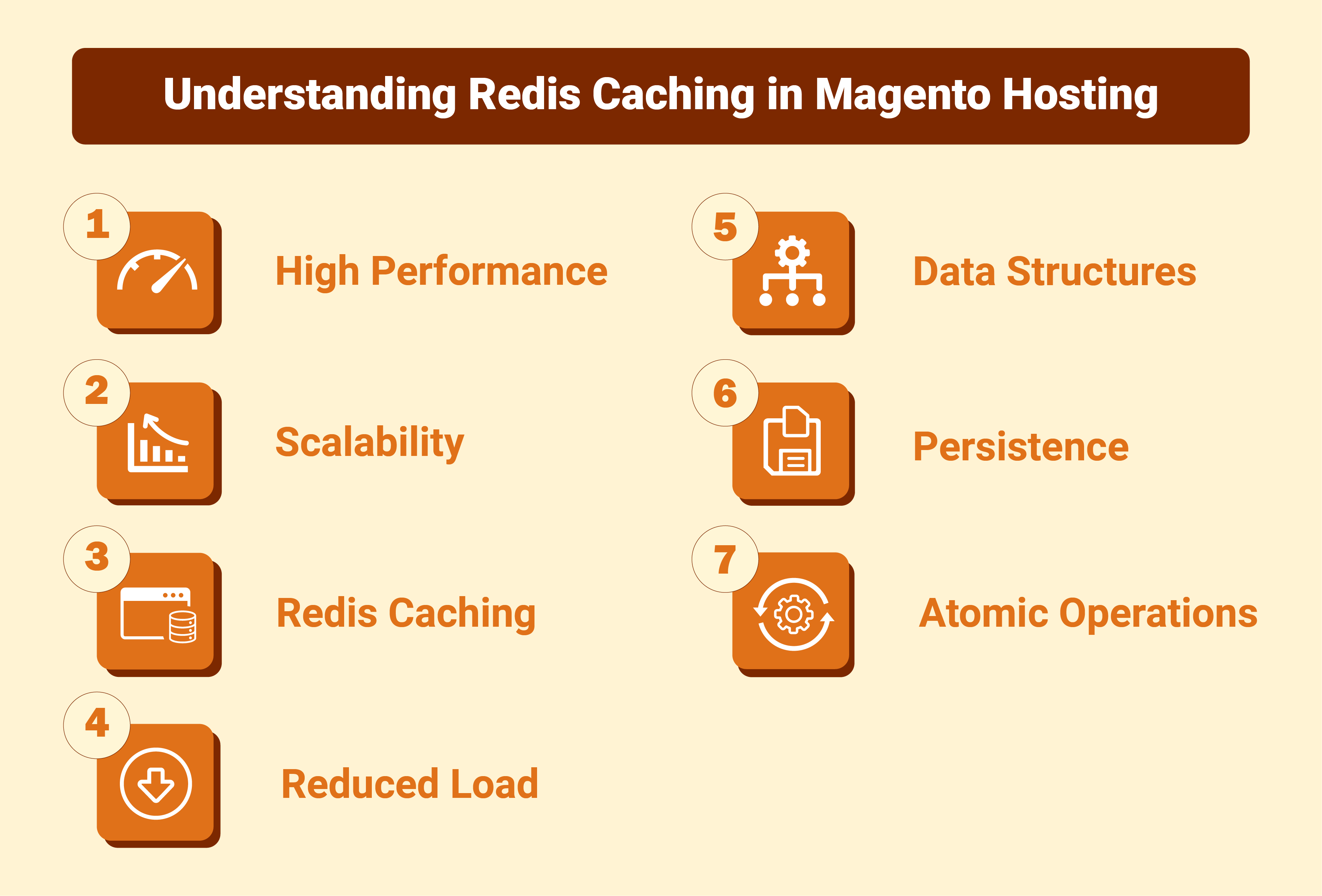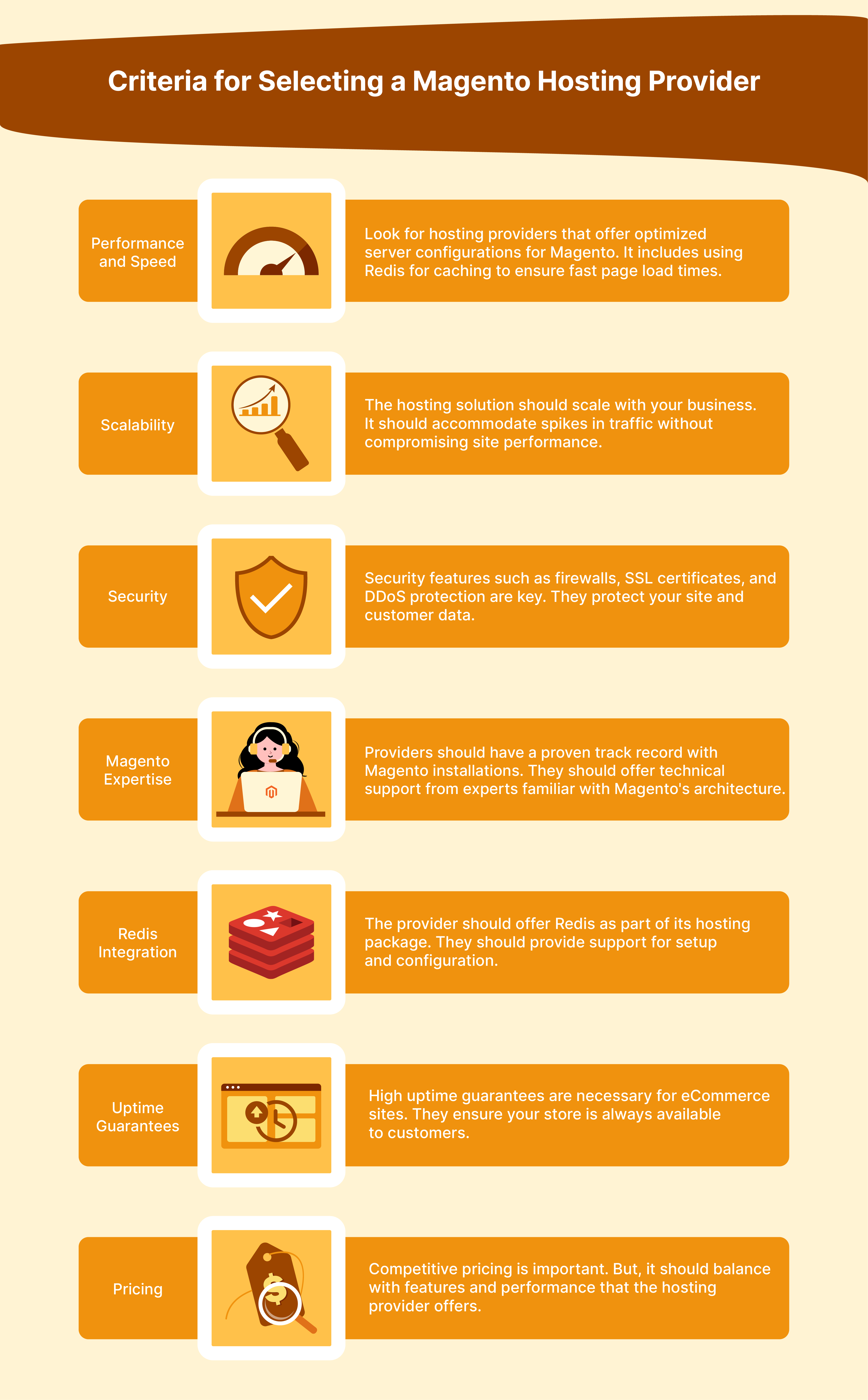
Using Magento Redis Caching to Optimize Store's Performance
Want to optimize website performance to avoid slow loading times? Use Magento Redis caching techniques for optimal Magento store performance. Redis caching improves page load times.
It stores accessed data in memory, reducing the need for repeated database queries. This article covers Redis caching benefits and supported hosting providers.
Key Takeaways
-
Redis caching improves Magento store performance by reducing page load times.
-
A Magento hosting provider should offer Redis support, scalability, and specialized Magento expertise.
-
Optimizing Redis settings and memory management can further enhance Magento performance.
-
Advanced Redis features like Lua scripting and Pub/Sub mechanisms benefit Magento stores.
-
Selecting the right hosting with Redis cache helps Magento's speed, reliability, and scalability.
Understanding Redis Caching in Magento Hosting

Redis stands for Remote Dictionary Server. It is an open-source, in-memory data structure store.
Redisis is useful as a database, cache, and message broker.
Redis supports various data structures. These include strings, hashes, lists, sets, and sorted sets with range queries. It also includes bitmaps, geospatial indexes, and streams. Key features are:
| Features | Description |
|---|---|
| High Performance | Redis data storage occurs in the server's RAM. It provides fast data access times compared to disk-based databases. Speed is essential for sites where milliseconds affect customer satisfaction and conversion rates. It makes it perfect to improve the speed and efficiency of Magento hosting environments. |
| Scalability | Magento is a leading eCommerce platform. It requires strong hosting solutions to manage its dynamic content and database. Adding Redis caching to Magento hosting boosts website performance and scalability. |
| Redis Caching | Redis caching stores accessed data in memory. It allows for quick data retrieval without needing to query the database each time. |
| Reduced Load | This method reduces the database load. It also decreases page load times. It benefits user experience and search engine ranking. |
| Data Structures | Redis offers advanced data structures, not simple key-value storage. It enables more complex applications and efficient data manipulation. |
| Persistence | Redis can persist data to disk. It ensures data is not lost after a server restart or power failure. |
| Atomic Operations | Redis supports atomic operations on complex data types. It is essential for maintaining data integrity in high-concurrency environments like Magento stores. |
How Redis Works with Magento
Magento uses Redis for session storage and caching. By default, Magento uses the file system for these tasks. It can become a bottleneck as site traffic increases.
Implementing Redis involves configuring Magento. This configuration stores cache and session data in Redis. It replaces the file system or database.
-
Session Storage: Redis manages user session data. It improves the speed and reliability of data retrieval for logged-in users. It is beneficial for Magento sites with high user engagement and personalized content.
-
Page Caching: Redis caches pages and content blocks. It reduces the need for Magento to render pages from scratch for each request. It reduces server load and speeds up response times for all users.
Setting up Redis in Magento involves installing Redis on the server. It also involves configuring Magento to use Redis as its caching backend. This setup improves site performance by reducing load times and enhancing scalability.
It does this by distributing the load across many servers if needed. With Redis caching, Magento stores can achieve significant performance improvements. It offers a smoother shopping experience for customers. It also ensures higher conversion rates for store owners.
Benefits of Using Redis for Magento
1. Speed Improvements
Redis reduces page load times for Magento stores. It achieves this by storing data in memory. It stores often-used data in RAM, accelerating read times compared to a hard disk. This approach allows for faster data retrieval compared to traditional disk-based databases. Faster page loads improve user experience.
2. Scalability
Redis supports horizontal scaling. It means Magento stores can handle more concurrent users without degrading performance. By using Redis, developers can add more Redis instances. It distributes the load and accommodates growing traffic. Such scalability is essential for eCommerce sites, especially during peak shopping seasons.
3. Reliability and Persistence
Redis offers various data persistence options. These ensure that data is not lost in case of a power failure or system crash. Redis uses an in-memory dataset with disk persistence. It provides a balance between performance and data safety. This reliability is essential for eCommerce platforms, where data integrity is paramount.
4. Advanced-Data Structure Support
Redis supports complex data structures like lists, sets, and sorted sets. Hence, it enables sophisticated caching strategies. Magento developers can use these structures to manage cache data. It includes invalidating cache entries or implementing features like leaderboards and session stores.
5. Atomic Operations for Data Integrity
Atomic operations in Redis ensure the smooth occurrence of complex transactions. It is critical in eCommerce environments. It ensures consistent data states even in high-traffic conditions. Magento leverages atomic operations to maintain accurate inventory counts and user session data.
6. Ease of Integration and Management
Redis ensures ease of use and management. It offers simple setup procedures and a wide array of Magento configuration options. Magento store owners can customize caching strategies to meet their specific needs. Redis also provides detailed monitoring capabilities. These allow administrators to track performance and adjust configurations as needed.
7. Security Features

Redis includes several security features, such as authentication and encryption support. These features help protect sensitive data stored in the cache. Magento stores can enjoy these security measures. They ensure that customer data and business information are safe.
Criteria for Selecting a Magento Hosting Provider

| Criteria | Description |
|---|---|
| Performance and Speed | Look for hosting providers that offer optimized server configurations for Magento. It includes using Redis for caching to ensure fast page load times. |
| Scalability | The hosting solution should scale with your business. It should accommodate spikes in traffic without compromising site performance. |
| Security | Security features such as firewalls, SSL certificates, and DDoS protection are key. They protect your site and customer data. |
| Magento Expertise | Providers should have a proven track record with Magento installations. They should offer technical support from experts familiar with Magento's architecture. |
| Redis Integration | The provider should offer Redis as part of its hosting package. They should provide support for setup and configuration. |
| Uptime Guarantees | High uptime guarantees are necessary for eCommerce sites. They ensure your store is always available to customers. |
| Pricing | Competitive pricing is important. But, it should balance with features and performance that the hosting provider offers. |
Best Magento Hosting Providers with Redis Support
| Hosting Provider | Features |
|---|---|
| MGT-Commerce | Optimized for Magento: Offers optimized cloud hosting environments designed for Magento. Ensures peak performance. Redis Support: Provides managed Redis caching to speed up Magento stores. Reduces page load times and enhances the user experience. Expert Support: Dedicated Magento expert support is available 24/7. They help customers troubleshoot issues and optimize their stores. Security and Compliance: Implements strict security measures. These include automated backups, SSL certificates, and compliance protocols to protect sensitive data. |
| Nexcess | Magento-Optimized: Delivers scalable cloud hosting solutions optimized for Magento. It includes built-in features like auto-scaling to handle traffic spikes. Redis and Varnish Caching: Includes advanced caching solutions like Redis for backend optimization. It also includes Varnish for front-end speed improvements. Magento Expertise: Offers 24/7 access to Magento specialists for technical support. |
| SiteGround | Performance-Oriented: Known for its high-speed hosting solutions. SiteGround provides Magento with SSD drives and Redis caching for improved performance. Managed Security: Provides comprehensive security solutions. It includes daily backups, SSL certificates, and custom firewalls. |
| A2 Hosting | Turbo Servers: Offers Turbo Server options for Magento hosting. They promise up to 20x faster page loads. Additionally, they provide Redis caching as a key performance booster. Developer Friendly: Provides SSH access, Git integration, and staging environments. It makes it a great choice for Magento developers. |
| Cloudways | Managed Magento Hosting: Provides a managed hosting platform for Magento on top cloud providers. It includes easy Redis integration for enhanced caching. Performance and Security: Features include auto-healing servers, free SSL certificates, and dedicated firewalls. |
| HostPapa | Optimized Magento Hosting: Offers hosting plans optimized for Magento. They provide Redis support to improve caching efficiency and site speed. Green Hosting: Focuses on hosting solutions that support the environment. It appeals to eco-conscious businesses. |
| Bluehost | Enhanced Performance: Provides Magento hosting with SSD storage and Redis caching. It helps to reduce load times and improve site performance. Comprehensive Support: Offers 24/7 support from knowledgeable staff. They provide resources and guides for Magento users. |
| Web Hosting Canada | Canadian Data Centers: Offers the advantage of local data centers. It reduces latency for Canadian visitors. Also, provides Redis caching for Magento stores. Scalable Solutions: Tailored plans that grow with your business. They ensure your Magento site remains fast and responsive as traffic increases. |
| InMotion Hosting | Magento-Ready Hosting: Delivers fast, secure, and reliable hosting environments for Magento. It includes easy Redis implementation for caching. Free Migration Service: Offers free migration services for Magento sites. It makes it easy for businesses to switch hosting providers without downtime. |
| GreenGeeks | Green Hosting: Focuses on green Magento hosting solutions without compromising performance. It offers Redis caching for Magento sites. Solid Performance: Provides SSD storage, LiteSpeed servers, and Redis caching. |
Tips to Optimize Magento Performance with Redis Caching
1. Fine-Tuning Redis Settings for Magento
Optimizing Redis for Magento involves adjusting configurations. These adjustments ensure optimal performance and resource usage.
-
Configuration Tweaks: Adjust maxmemory to optimize system memory use. Configure maxmemory-policy to control memory limit handling.
-
Persistence Settings: Balance performance and data safety. Configure snapshotting and AOF settings according to your store's needs.
2. Memory Management

Effective memory management is important for maintaining Redis performance.
-
Monitoring Memory Usage: Check Magento Redis memory usage. It prevents overallocation issues.
-
Optimizing Data Structures: Use Redis data structures. It minimizes memory consumption while maximizing performance.
3. Data Eviction Policies
Data eviction policies are key to managing data for most memory capacity.
-
Policy Selection: Choose an eviction policy that fits your caching strategy. Options include volatile-lru for expiring keys or allkeys-lru for all keys.
-
Customizing Policies: Tailor policies to keep critical data cached. Allow eviction of less important data for new entries.
4. Advanced Redis Features for Magento Stores

Magento can enjoy Redis's advanced features.
-
Lua Scripting: Use Lua scripting for atomic operations. It reduces many server round-trips.
-
Pub/Sub Mechanisms: Use publish/subscribe for real-time notifications. It enhances interactivity and data updates.
5. Using Redis for Session Storage
Redis improves performance by storing session data faster than databases.
-
Configuration: Set up Magento to store session data in Redis. It ensures quick access to user sessions.
-
Scalability: Redis scales to support more user sessions without performance loss.
6. Full Page Caching with Redis

Full-page caching with Redis reduces response times.
-
Setup and Configuration: Enable Redis for full-page caching in Magento. This stores HTML pages in memory for quick delivery.
-
Cache Invalidation: Use smart cache invalidation. It keeps content up-to-date while maximizing cache hits.
Magento stores can see performance gains by optimizing Redis settings. It improves user experience and could increase sales and satisfaction.
FAQs
1. How do I configure Redis in Magento 2 to optimize performance?
To configure Redis in Magento 2, change the app/etc/env.php file. Specify Redis as the caching backend. Set the Redis server host, port, and database number for seamless integration.
2. What is the significance of the Magento 2 Redis cache configuration file?
The Magento 2 Redis cache-configuration-file stores settings for Redis integration. It includes cache and session storage details. It ensures proper communication between Magento and Redis for efficient caching.
3. Can I configure Redis for more than one database in Magento?
Yes, you can configure Redis for more than one database in Magento. Specify database numbers in the Redis configuration file. Use separate databases for different purposes, optimizing data management.
4. How does Redis enhance page caching in Magento 2?
Redis enhances page caching in Magento 2 by storing HTML pages and content blocks in memory. It reduces the need for Magento to regenerate pages for each request. It results in faster response times and improved Magento UX.
5. What role does Redis play in Magento 2 backend cache management?
In Magento 2, Redis acts as the backend cache management system. It stores accessed data in memory. By configuring Redis for backend caching, you can optimize data retrieval processes. It reduces server load and enhances system performance.
6. How can I configure Redis cache for Magento 2 to maximize efficiency?
To configure Redis cache for Magento 2, ensure proper settings in the env.php file. Include Redis server details and cache configurations. This setup enables Magento to leverage Redis for caching. It results in enhanced performance and scalability.
Summary
Using Magento Redis caching helps in maximizing store performance and user experience. Explore the benefits discussed in this article:
-
Faster page load times: Redis caching ensures swift data retrieval, leading to faster page loads.
-
Enhanced user experience: Redis caching provides smoother interactions, improving user satisfaction.
-
Improved scalability: Redis enables easy scaling to handle increased traffic without performance degradation.
-
Advanced data structure support: Redis supports complex data structures, facilitating efficient caching strategies.
-
Robust security features: Redis includes authentication and encryption, ensuring data security in the cache.
Ready to optimize the page loading of your Magento store? Explore managed Magento hosting for seamless performance enhancement.



